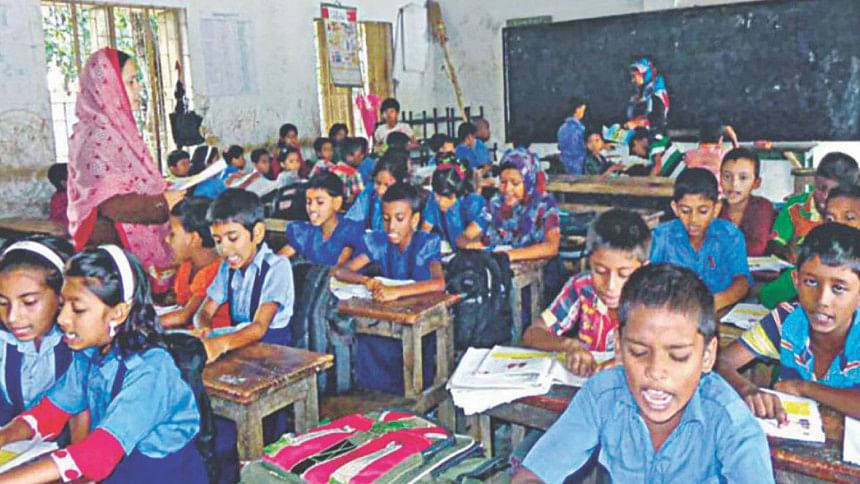How we teach matters

One of the works by Nobel prize-winning economist couple Esther Duflo and Abhijeet Banerjee that I personally find very interesting is the "market math" study. Taking into account evidence that most children in India perform poorly in arithmetic operations typically taught in school, the study explored the arithmetics skills of children from poorer families who work in informal markets, selling fruit for example, and find that these working children seem to perform relatively complex arithmetic operations mentally during work when they count the goods they're selling or when they're calculating the payments due or the change to give from the transaction. This finding raises crucially important questions. Could it be that these working children develop their arithmetic skills because they are practically learning by doing? If same-aged school-going children are being taught arithmetic in classrooms with their teacher and textbooks, why are they struggling to perform and to learn what they are expected to at their level?
If we know what to teach, if we have people to teach that, then could part of the problem be that we do not know how to teach? Indeed, pedagogy matters. It's an important cog of the machine that is an education system. Pedagogy may very well be what makes or breaks the effective delivery of a lesson. For a lesson to be effective, capturing and holding the interest of the audience is key. I myself have been a student in classes where, bored, I simply doodled in the open khata in front of me. What we were being taught were distant concepts, with little relevance to our realities, to the real world we saw around us. What a waste of time because I hardly learnt anything in these classes that I remember today. Multiply my experience to thousands around the country, and we have a problem worth giving national-level attention to.
Indeed, there is so much scope for research on learning outcomes in Bangladesh and it is a tragedy that we are so late in building a database of evidence on this. For one, we have no baseline to assess whether things have been improving over the years. If we find today that school-going children of a particular grade are not being able to solve the math problems they should be able to solve, we cannot know whether this has always been the case. If education is to translate into actual learning, we need to start building a database so that we can determine what works in improving children's learning outcomes.
Fortunately, attention is being given to pedagogy at earlier levels of education in Bangladesh, especially for early childhood development in terms of "learning by playing" and "learning by doing." Even so, enough attention is perhaps not given to the pedagogy of education for underprivileged children and to the fact that teaching children with different lived realities also requires a certain sensitivity. I realised this even more from my own experiences, on one hand, teaching homeless street children and, on the other hand, teaching children studying in a leading English medium school. Teaching these two different groups required different pedagogical approaches because the children led distinct lives. Often, I wished I had some training—to learn not what to teach, but how to teach. After all, it's not just what we say but how we say it that matters.
Then there were the pre-conceived notions and "biases" in education, or miseducation, as sociologist Diane Reay calls it, that I needed to actively battle when it came to teaching lesser privileged children. People often think: "Just teach them the basics needed to survive, they won't go far anyway" or "Privileged children will go on to become scientists and economists, but underprivileged children will become bus drivers, maids." Education researcher Jean Anyon writes about these biases—"The ways in which students are taught, even more than what they are taught, prepare them to occupy their respective class positions. Working-class kids are heavily disciplined and instructed by rote; the sons and daughters of professionals get creativity and self-expression; the children of the business class are taught authority, mastery, and self-control."
We need to begin thinking about, talking about and challenging these issues. We need to invest in teacher training in terms of how to teach, especially in the case of school teachers who teach our young children. For university teachers, the solution lies with the teachers themselves—in each of their individual will to do better. If anything, university classrooms are platforms for interactive learning, open discussions and debates, and it is the job of university teachers to facilitate such an environment for learning in their classrooms. In his book, Pedagogy of the Oppressed, educator and philosopher Paolo Freire describes the ideal pedagogy of universities as treating the student as a co-creator of knowledge- and traditional pedagogy, the type we're sadly used to, as treating students as empty vessels to be filled with knowledge. Freire strongly argues for a change from the traditional to the ideal. For the sake of our education system, we must too.
Dr Rubaiya Murshed is lecturer (on study leave) at the Department of Economics, University of Dhaka, and a recent PhD from the University of Cambridge.
Views expressed in this article are the author's own.
Follow The Daily Star Opinion on Facebook for the latest opinions, commentaries and analyses by experts and professionals. To contribute your article or letter to The Daily Star Opinion, see our guidelines for submission.

 For all latest news, follow The Daily Star's Google News channel.
For all latest news, follow The Daily Star's Google News channel. 




Comments